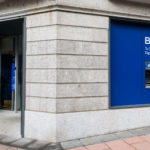BBVA reopens 250 branches in Spain; 55 percent of its offices are now open to the public
Between last week and this week, the bank will reopen an additional 250 branches, to coincide with Spain's careful easing of confinement restrictions. BBVA has also initiated the gradual return to work for those employees who fulfill critical business functions. The health of the bank’s customers and staff is the fundamental factor guiding this process. In the next few days, 200 employees and external contractors will return to their posts in central services, and 1,300 staff will return to branch offices throughout Spain.

Between this week and last, BBVA will have reopened 250 branches in Spain. The newly opened branches join the nearly 800 branch offices that remained open half days and are part of the 1,175 total branch offices to be open either every workday or on alternating days. As a result, at the end of this week there will be 1,425 branches open each day, representing 55 percent of the bank’s network of branches in Spain (2,593 offices). This step implies a return to work for 1,300 employees, bringing the total of branch office employees working onsite in Spain to 3,300, 21 percent of the total workforce.
Furthermore, in Spain, in the coming days, around 200 employees and external providers of central services in critical functions are returning to their offices. They include a part of the global markets team in the trading room of CIB (Corporate and Investment Banking) and infrastructure/operational employees in the engineering area. Ninety-eight percent of BBVA’s central service employees in Spain will continue to work from home.
A five-point return-to-work plan
The bank has drafted a return-to-work plan based on five principles.
First, the need to be cautious. All employees returning gradually to their normal workplaces must be safe. The only employees to return to work will be those who have not tested positive, are symptom-free, and are neither in quarantine nor part of a high-risk group. BBVA will be following an approach that includes serology testing and PCR virus detection, that will be administered according to medical criteria.
The second principle is based on a gradual return. Employees, whether in central service roles or working at the branches, will return to work gradually and as needed, in line with the most recently available data about the pandemic trends. To the extent possible, BBVA will also take employee personal situations under consideration as the return to the workplace plan is implemented.
Third: team work shifts will be encouraged, where appropriate, to ensure employee safety and business continuity in case a resurgence occurs. For the central service functions, the first employees to return to the office will be those whose nature of their jobs requires equipment or devices that are only available at the work onsite. BBVA will continue promoting remote-working for the rest of the functions. Branch employees will return to the their offices in line with customer demand, which will be dynamically monitored.
Fourth, hygiene and safety measures. The bank will follow-up on early positive identification healthcare protocols. Of the measures taken, for example, the access points to the main corporate headquarters buildings will have temperature-taking systems installed. In addition, fingerprint biometric access will be deactivated in order to prevent spreading the virus hand-to-hand. In addition, external visitors will not be allowed on premises.
Furthermore, BBVA has established a set of protocols to guarantee that all employees, in central offices or at branches, are safe and the risk of contagion is minimized. These guidelines include controlled access to the workplace, a minimum distance between work areas, limiting meeting rooms to four attendees, the mandatory use of sanitizing hand gel, scarves, and face masks, that will be provided by BBVA. The bank will also install protective partitions at reception and customer service desks, something that has already been put in place at the branch offices.
Lastly, early identification protocols have been defined. To prevent the spread of the disease among employees, it is important to know who has had contact with those who have tested positive. Mobile technology can facilitate this through apps. BBVA has developed an app that will track close contacts while onsite, which will be piloted next week in Spain. The bank will then work to offer the app to all employees returning to high density premises all around the world.
Finally, to prevent potential new cases, the Group is also encouraging flexible hours over the course of a normal workday, in order to reduce people congestion at facility entrances and in public transportation. In the same vein, work-related travel continues to be limited, except when absolutely necessary. Furthermore, BBVA will continue to support online employee training.